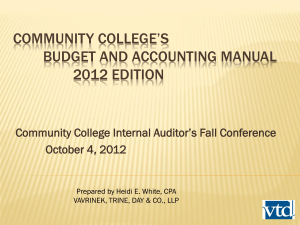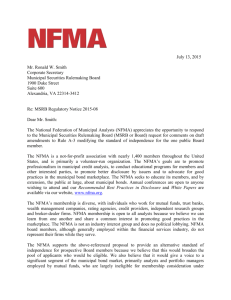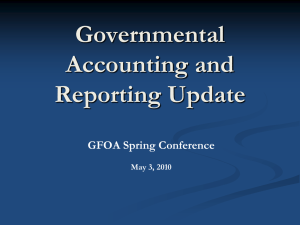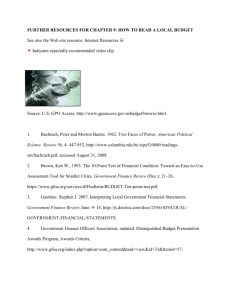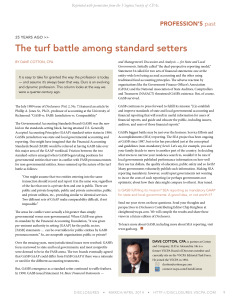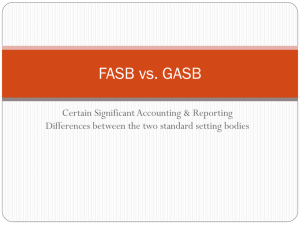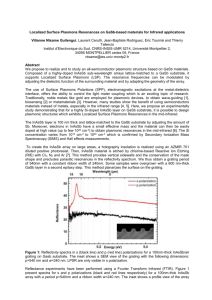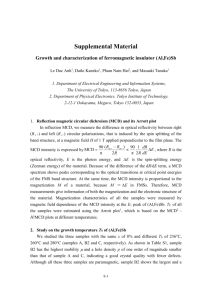NFMA position paper on GASB and its importance to municipal
advertisement
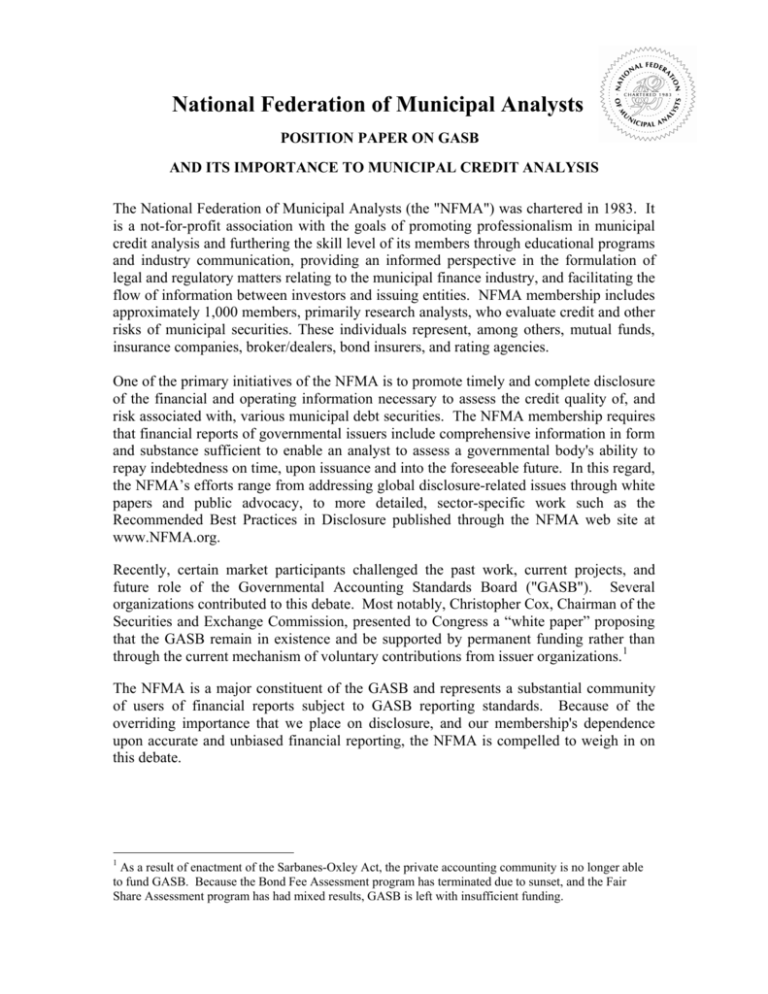
National Federation of Municipal Analysts POSITION PAPER ON GASB AND ITS IMPORTANCE TO MUNICIPAL CREDIT ANALYSIS The National Federation of Municipal Analysts (the "NFMA") was chartered in 1983. It is a not-for-profit association with the goals of promoting professionalism in municipal credit analysis and furthering the skill level of its members through educational programs and industry communication, providing an informed perspective in the formulation of legal and regulatory matters relating to the municipal finance industry, and facilitating the flow of information between investors and issuing entities. NFMA membership includes approximately 1,000 members, primarily research analysts, who evaluate credit and other risks of municipal securities. These individuals represent, among others, mutual funds, insurance companies, broker/dealers, bond insurers, and rating agencies. One of the primary initiatives of the NFMA is to promote timely and complete disclosure of the financial and operating information necessary to assess the credit quality of, and risk associated with, various municipal debt securities. The NFMA membership requires that financial reports of governmental issuers include comprehensive information in form and substance sufficient to enable an analyst to assess a governmental body's ability to repay indebtedness on time, upon issuance and into the foreseeable future. In this regard, the NFMA’s efforts range from addressing global disclosure-related issues through white papers and public advocacy, to more detailed, sector-specific work such as the Recommended Best Practices in Disclosure published through the NFMA web site at www.NFMA.org. Recently, certain market participants challenged the past work, current projects, and future role of the Governmental Accounting Standards Board ("GASB"). Several organizations contributed to this debate. Most notably, Christopher Cox, Chairman of the Securities and Exchange Commission, presented to Congress a “white paper” proposing that the GASB remain in existence and be supported by permanent funding rather than through the current mechanism of voluntary contributions from issuer organizations. 1 The NFMA is a major constituent of the GASB and represents a substantial community of users of financial reports subject to GASB reporting standards. Because of the overriding importance that we place on disclosure, and our membership's dependence upon accurate and unbiased financial reporting, the NFMA is compelled to weigh in on this debate. 1 As a result of enactment of the Sarbanes-Oxley Act, the private accounting community is no longer able to fund GASB. Because the Bond Fee Assessment program has terminated due to sunset, and the Fair Share Assessment program has had mixed results, GASB is left with insufficient funding. National Federation of Municipal Analysts Position Paper on GASB and Its Importance to Municipal Credit Analysis THE NFMA SUPPORTS THE CONTINUED EXISTENCE OF GASB The NFMA is in full support of the continued, separate existence of GASB as the independent arbiter of accounting standards and financial reporting guidelines for governmental entities. While the Financial Accounting Standards Board ("FASB") effectively fulfills its role of setting standards in the corporate arena, we believe that the markedly different revenue, expense, asset and liability dynamics in the governmental sector present more than sufficient reason for the existence of a separate body to address governmental accounting and financial reporting standards. To an extent not present in the corporate world, legislative and regulatory actions have an overriding impact on the major revenue generated by, and the expenditure burdening, state and local governments. For example, revenue (and often its accrual) is generally set by government fiat as the government itself creates laws that determine taxation and fee setting forming the basis for its income. Similarly, governments often create their own spending requirements by statute and regulation. These dynamics are absent in the corporate world. In the corporate arena the accounting and reporting of expenditures serves a financial community that is primarily concerned with solvency and liquidity matters. In addition to providing similar information for governmental entities, government reporting must also address the proper stewardship and budgeting of funds for the public purposes set out by elected bodies or by electoral fiat (such as might be the case with a constitutional amendment requiring specific expenditures or earmarked revenue allocation). Finally, over a period exceeding 40 years governmental accounting has evolved to reflect the segregation of general revenue, special revenue, enterprise and fiduciary operations of state and local governments, thereby mimicking the governments’ budgetary processes in a manner long accepted by its constituents. This process has no parallel in the corporatedirected standards and mandates addressed by the FASB. For these reasons, it is critical that we maintain a standard-setting entity such as GASB to focus exclusively on governmental accounting and financial reporting. GASB’S USEFULNESS TO THE SOCIETY OF ANALYSTS As one of the largest constituent societies served by the GASB, the NFMA acknowledges and appreciates the rigor of independence and high standards that have been the hallmark of GASB’s work in accounting and financial reporting. Evidence of GASB’s responsiveness to the NFMA and its membership can be found in a number of areas: ! GASB’s rigorous and comprehensive standards-setting process, including the Exposure Draft Process, a commitment to openness through its sponsorship of public hearings, and phased-in implementation when there are major changes promulgated in accounting and/or financial reporting; March 2008 2 National Federation of Municipal Analysts Position Paper on GASB and Its Importance to Municipal Credit Analysis ! GASB’s proactive consultation with leaders in the municipal analytical industry via corporate meetings and active participation in the industry’s seminar and conference programs; and ! GASB’s active inclusion of municipal analysts in advisory groups and forums, such as the Government Accounting Standards Advisory Committee ("GASAC"). This active participation and response has led to adoption of important standards addressing crucial analytical issues, in such areas as pension measurement/reporting, derivative disclosure, and infrastructure accountability. While GASB remains of great value and usefulness to the analyst community, it is important to clarify our membership's key need for GASB – that it acts as the arbiter of standards for accounting and financial reporting. The NFMA feels strongly that GASB should not stray from its primary role of addressing the consistent treatment of financial transactions. In assessing a governmental body's ability to repay indebtedness on time, upon issuance and into the foreseeable future, analysts look to the entity’s financial statements to determine such metrics as liquidity, the composition of fixed and variable revenues and expenditures, the composition of assets and liabilities, and the debt structure (including fixed and variable debt, amortization schedules, and sources of repayment). Analysts also review the entity’s financial statements issued over time to assess financial stability and flexibility and the maturation of contingent liabilities. 2 While the NFMA appreciates the GASB’s due process procedure, we note that this balancing process has not always resulted in a determination of materiality consistent with the needs of analysts. For example, the adoption of Statement 34 resulted in the elimination of certain information useful to many credit and investment analysts.3 Similarly, while the NFMA appreciates the GASAC’s process for creating a Priority List for the GASB’s Technical Plan, we note that multiple constituencies with differing interests are represented on the GASAC. Consistent with the NFMA's primary interest in 2 Some, but not all, of this trend information may be contained in the most current Comprehensive Annual Financial Report ("CAFR"). 3 Specifically, Statement 34 makes optional the reporting as a Major Fund those items that do not meet the stated statistical tests found in Paragraphs 76a and 76b. This change relegated many debt service funds, under the previous model reported as a combined Debt Service Fund on the General Purpose Financial Statements ("GPFS"), to inclusion as aggregated with other fund types in the unitary “Non-Major Funds” in the GPFS. As a result, users now must make do with an “in relation to” opinion on this key piece of debtor information. Moreover, as it is bond industry practice to include only the GPFS in offering documents, the analyst often must go elsewhere to find the CAFR containing the combining statements showing the debt service funds’ activities and financial positions. As a practical matter, obtaining a CAFR in a timely manner can be particularly problematic for a buy-side analyst who may have limited time to make a purchase recommendation. March 2008 3 National Federation of Municipal Analysts Position Paper on GASB and Its Importance to Municipal Credit Analysis accounting and financial reporting, we find the current Research Projects on Economic Condition Reporting and Electronic Financial Reporting of substantially lesser value to our membership. In both instances the NFMA views the Projects as potentially redundant and believes that the GASB’s limited resources would be better used elsewhere. With regard to Economic Condition Reporting, industry groups including the NFMA are already addressing the issue of disclosure content. Likewise, public and private sector entities have already developed or are refining existing software for financial reporting - electronic transmission and filing of financial information is already widespread in the industry. GASB’s ROLE IN THE REPORTING OF SERVICE EFFORTS AND ACCOMPLISHMENTS Much of the recent controversy was generated by the GASB's efforts in reporting of Service Efforts and Accomplishments ("SEA"). As observers of the state and local government process, we recognize there are constituencies seeking to improve “accountability" with regard to the services provided by state and local governments. Many taxpayers are interested in seeing “where their tax dollars went” in forms that fall outside the ambit of financial reporting. While improved service reporting is desirable, it is unclear that GASB should be the entity developing these advisory guidelines. 4 NFMA acknowledges recent statements of the Financial Accounting Foundation (FAF) Trustees that SEA is within the purview of the GASB. However, from the NFMA’s perspective the SEA project is of limited value to the analyst community. In the current climate of heightened volatility in municipal finance, NFMA would not like to see the GASB dilute its limited resources. Rather, GASB should strengthen its role as arbiter of standards for municipal accounting and financial reporting – that is, setting standards for the accurate accounting and reporting of financial resources collected and spent in the state and local government sectors. 4 We note that when Concept Statement No. 2 was adopted in 1994 few efforts had been made to address the issue of SEA. Since that time numerous government entities and public interest associations have begun to address this issue. The NFMA itself developed a series of sector-specific Disclosure “Recommended Best Practices” that identify operating information of value to municipal analysts in determining an entity’s ability to repay its debt. (The Recommended Best Practices can be obtained on the NFMA’s website at www.NFMA.org.) March 2008 4
